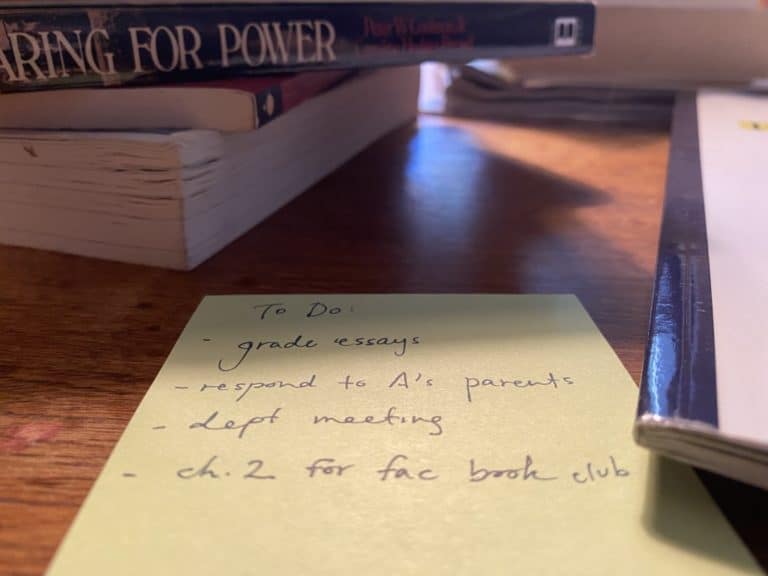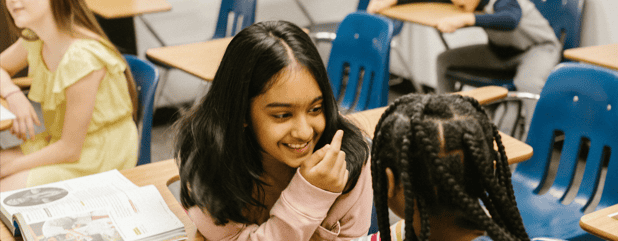R.E.A.L.® Teacher Feature: Holly Silberman
Thank you to Holly Silberman for sharing her REAL life with us! Holly is a middle school English teacher at William Penn Charter School in Philadelphia. Here are her thoughts on discussion, R.E.A.L.®, and learning.
Name/Hometown:
Holly Silberman/Doylestown, Pennsylvania

Current School:
William Penn Charter School, where I teach sixth and eighth grade English.
Can you describe yourself as a student in three words?
Curious, volunteer, perfectionist.
Who was your favorite teacher, and why?
Miss Perry was my favorite teacher. She was an English teacher. She just had this way about her that made me feel comfortable talking about my life, and not just about English class-related things. She always pushed me to do my best and to be the best version of myself as a writer and as a reader. She also made it very obvious when she was pleased and when students were doing a good job. That made me feel very accepted, and very much like I wanted to do well for her.
When it comes to class discussion, what is your “why?” What feels compelling and important about teaching these skills?
I think the “why” has a lot to do with how today’s kids’ main mode of interaction with one another is through screens. I feel as though they’ve lost some of the essential skills to be in-person and have a real conversation.
And secondly, it’s a very divisive culture we live in right now. People are not willing to hear other people’s points of view, and they’re afraid to express themselves because of fear of retribution. I think it’s really important to teach kids early on how to express themselves, how to listen to others, and how to listen to understand instead of to argue.
Thinking back to your first R.E.A.L. ® Discussion, what were you worried about going into it? Did anything surprise you?
I was worried about coming up with the right questions for kids to dig into with enough evidence to bring to class. I was also nervous about them sitting there silently staring at each other and finishing the entire discussion in five minutes.
That was a big fear, but right away it wasn’t a problem. They were really engaged.
I was actually surprised by how some of my quieter students really came out of their shells in the smaller groups. One piece of advice I would give to other teachers doing R.E.A.L. ® is to be very intentional in terms of grouping. In the first discussion of the year, I take a lot of notes about who’s participating, who’s leading, etc., so the next time I can make sure to rearrange groups so we have the best mix of kids to allow everyone to get something out of the exercise.
What other advice would you offer to teachers about how to make R.E.A.L. ® work really well in your classroom?
My kids really love doing skits to demonstrate what a bad discussion looks like before we get started. I give them roles: you’re the one who’s always talking, you’re the one who’s completely disinterested, etc. They get really into doing the roles. I love launching the program this way.
I also sometimes have groups leave the room and record themselves. That way I can listen to groups one-on-one rather than try to bounce between four discussions at the same time.
And don’t forget to do the shoutouts, because that’s so great. They really love it.
How do you go about planning for a R.E.A.L. ® Discussion?
I try to make it very intentional: right before a writing assignment, we have a discussion. They don’t realize that they’re generating ideas for their writing assignment, but they are.
And then I always try to lead them up to the discussion without their knowing it. Today, for example, we did charts on character change. And then at the end, I said, ok, one of your questions that you’re going to prep for is which character changed the most over the course of the novel. So, they had done activities leading up to that in class, which makes the DQ prep a little richer.
How have you collaborated around the R.E.A.L.® framework with colleagues?
Within grade level teams, we share DQ ideas, talk about best practices we’ve used in our classrooms, workshop how to deal with a challenging student. It’s great to collaborate.
And then across divisions, what’s awesome is that we’ve set it up so that eighth grade is the introductory year to R.E.A.L.® Students are expected to remember it and know how to do it in ninth grade, and it just keeps building from there.
One thing I really love about our English department is we’ve been very purposeful. We’ve been very intentional about guiding them along through middle and upper school.
Thinking back on the past year, was there a moment where a student had a breakthrough that really stuck out to you?
Yes. We did a R.E.A.L.® discussion about the book Night, which is a difficult text about the Holocaust. There was a moment when somebody brought up the symbolism of nighttime – how the concepts of daylight and nighttime were essentially flipped, because night was a safe time when it was possible to hide, and the daylight brought danger and exposure. Another kid said, “I’d never thought of it like that – that is so good.” And you could see the breakthrough on his face.
Throughout the book, every time a new moment of daylight or nighttime came up, it related back to what we talked about in that R.E.A.L.® discussion. I think it just gave that student access to the book in a deeper way that he otherwise would not have had. And seeing it on his face – that’s the moment we live for as educators: when a student not only “gets it,” but they’re excited about it, and they keep applying it again and again.
He ended up writing about that topic. It was an awesome moment. And I would say he was a child who had struggled to find the abstract in literature. He was a very literal kid. This time, he felt like he understood symbolism – and that understanding didn’t come from me.
What is your go-to reward for grading a big pile of homework?
A glass of wine and a hot bath, and reading whatever I want to read. No more kids’ papers! I’m reading the next thriller, my book club book, or something else not written by a child.
What inspires you?
I’ve been inspired by the students. There are moments when they’re just not getting it, or they’re not applying things, and as a teacher, you can think, why am I doing this? And then you have little minutes throughout the day where they make you smile, or they surprise you with an answer, or they make you look at a text differently. And that just always keeps me inspired and coming back every single day. It’s like a dopamine hit when they get something. That inspires me – and my colleagues always keep me smiling.






